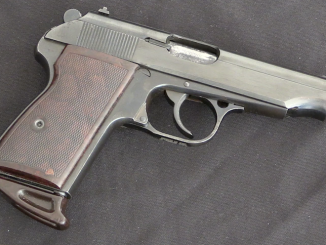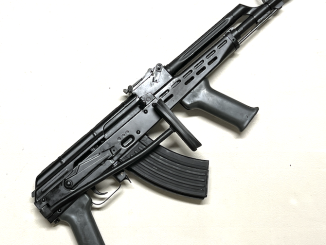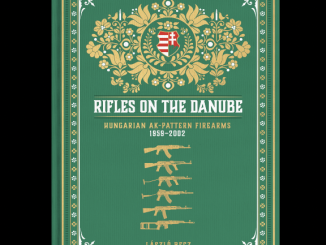Today we have the Gepárd M6 Lynx out at the range to try out! My impression is that mechanically, the gun is very well constructed. Everything operated cleanly and smoothly, and there were no malfunctions of any kind. The magazine design in particular seemed very well thought out and built – and that magazine is a critical part of any self-loader that can easily cause lots of problems. The handling is a little awkward because of the long length of pull, and the recoil is definitely not “soft”. Reviewing the high speed footage after I got home, it is clear that the recoil impulse is typical of long-recoil actions. Namely, the bolt and barrel impact the rear of the receiver going pretty fast, and it is that impact that transfers the recoil impulse to the shooter. It is less unpleasant to shoot than the Zastava M93, to name one example, but still a beast of a gun!
Related Articles

Semiauto pistol
A Walther copied by Hungary for Egypt: the WALAM 48
The WALAM 48 was a copy of the Walther Model PP made by Fegyver- és Gépgyártó Részvénytársaság (aka FÉG) in Hungary in the years after World War Two. It was originally produced as the 48M […]

Semiauto Rifles
AMD-65: The Specialist’s AK Turns Standard-Issue
Get your copy of “Rifles On The Danube” today! https://www.kickstarter.com/projects/headstamp/rifles-on-the-danube?ref=84e865 The Hungarian AMD-65 (Automata Módosított Deszantfegyver – “Modified Paratrooper Automatic Rifle”) was requested first in 1964 because the standard AKM-63 rifles in Hungarian service were […]

Video
Rifles on the Danube: Hungarian AK-Pattern Firearms – NOW SHIPPING
Now Shipping! Order your copy here: https://www.headstamppublishing.com/danube-book At the end of the Second World War, Hungary was occupied by Soviet troops and soon fell into the Soviet sphere of influence, joining the Warsaw Pact in […]

Bad idea for a target-shooting scenario:
Cardboard fiend: “That bearded gun nerd will never get me when I’m hiding inside this armored truck!” [Lynx fires several times into the truck]
Ian: “What truck?”
Merry Christmas, guys!
Two shots from a Barrett 82 convinced me to never shoot an unsuppressed .50 BMG ever again. The concussion from a .50 BMG muzzle brake can’t be good for your brain.
I shot at an indoor range once when there was a .50 set up at one end (they were selling chances to shoot it at 5 bucks a round) it was a big range with 20+ stalls and we were still getting the pressure wave all the way at the other end. Everyone would be shooting, you’d here “FIRE IN THE HOLD” everyone would stop, pull back a bit and cringe, the .50 would fire, and everyone would go back to shooting. It was absurd.
No good for your retina also. I don’t know for other countries but the French army is said to have a limit of 20 rounds a day in training and 50 rounds a day in operation.
I wonder if a silencer is made for the GM6 Lynx? On the one hand a bullpup configuration would certainly help with a bulky .50 silencer. On the other hand tuning the long-recoil action of the GM6 might be tricker with a can on the muzzle?
Yes, the manufacturer SERO Kft. makes one specifically for the GM6. as can be seen on the product’s website: https://gm6lynx.com
You ought to see the effect of a full-auto burst fired from the mount on an M998T HMMWV, which was the roll-cage troop-carrying version of the original HMMWV for the 9th ID. They tried firing that a couple of times, and discovered that a.) They’d really ‘effed up by not building those with the same heavy armored windshields that they put on the shellback TOW HMMWVs, and that b.) you can do really spectacular damage to a vehicle with muzzle-blast alone. Not to mention, the crew of said vehicle…
The M2HB is a device to be respected, and not played around with. It isn’t in the same league as the Carl Gustav, but… It’ll do some damage.
There has been a laser-sintered titanium muffler for M2HB been out for a few years now. that should protect the crew better and cover the prominent muzzle blast. There are also more conventionally manufactured suppressors.
Didn’t the 9ID also use dune buggies with M2 machine guns? even less protection for the crew. *shudder* Must have been horrible. Already a normal 7.62×51mm machien gun firing directly above your head is quite unpleasant from my own experience. Wasn’t that smart an idea to use open vehicles like that.
The Chenoweth FAV or “Fast Attack Vehicles” were before my time with the division. The guys I talked to about firing weapons off of those things were emphatic about “fire to the left, the right, the rear… Anything but over the driver…”. From what I heard, the first time they tried doing that with an M2HB, the driver wound up being a MEDEVAC with his eyes and ears bleeding. All those models you saw with the M2HB up top, bouncing around the desert with guns blazing? Nobody actually ever did that, and if they did, someone got badly hurt and someone else got non-judicial punishment over it. I think they fired the M60s off those, exclusively.
What used to crack me up about that whole deal with 9th ID was that we had all these freakin’ systems mounted up and out doing training, but… There were safety-of-use messages out on most of them, saying “No can use”. The big mistake was the M998T, which was the bare-bones basic version of the HMMWV, but with a roll cage on the back to carry six guys and a weapon. You could, it is true, fire the Mk19 40mm GL off the thing, but… We only had like one of those per company, then platoon. Everything else was “M2HB”, but you weren’t supposed to actually shoot the damn things with people inside the cab of the truck, which kinda-sorta made using them while mobile a bit… Problematic. As well, the mount position didn’t exactly give you the ability to fire 360 degrees, either–You had the frontal arc of something less than 180 degrees, and anything else meant you were having to work around the roll cage bars.
Frankly, until they finally decided that “Motorized” meant “Stryker”, the whole thing was a non-starter. 9th ID was basically a trip-wire deathtrap, because anyone with even vaguely modern recon and artillery could have handily sent most of us to our graves without much real effort. I enjoyed my time in the division, but… Man, was that whole idea dumb as a box of rocks. If you don’t have your troops protected against indirect fire in modern warfare, you’re basically writing them off, and I don’t care how much “agility” or “battlefield intelligence” you think you have. In modern war, you’ve either got “So light they can’t find you in amongst the cover/concealment” or “So heavy they need to blast you with something they can kill tanks with…”. There ain’t no “in-between”, unless you’re talking about something where you’ve got all the firepower on your side.
The other darkly humorous thing about the 9th? Equipping the Engineer battalion with the MICLIC mine-clearance system. See, you’re not supposed to fire those bastards unless you’re either under cover, or under armor. Firing them from soft-skin vehicles is a serious no-no, but… There wasn’t a single piece of armor anywhere in the Division. But, we had the MICLICs, one per platoon with a 5-ton truck that could carry two reloads for the trailer, for a total of 6,000lbs of C4 wandering about the battlefield with us. How we were to use them, tactically? No. Fscking. Idea. At all. I mean, OK–set the system up, it’s gotta be towed by the same vehicle you’ve got your reloads stuck into, ‘cos that’s the one 5-ton per platoon, so your initial shot is gonna be going in over the truck with two reloads in it, and even if nobody on the other side notices you drive up with the 5-ton, park it, and then dig the foxhole for the suicidal cretin who’s failed to grasp the fundamentals of the whole enterprise when it was explained to him…? They’re sure as hell to clue in, once that first shot has gone in. And, since the MICLIC clears only 100m lane when everything has gone perfectly, and the average depth of a Soviet doctrinal protective minefield is 300m…? Well, guess what? You get to somehow back that 5-ton out of the firing position, get to the reload point, reload in a highly-optimistic half-hour, and then drive roughly 100m into the minefield to fire your second shot, followed by carefully backing the truck and trailer 100m back to where you started, reload again, and then repeat it all for the third shot.
Putting it to you bluntly, that whole circus wasn’t happening anywhere outside of highly delusional training exercises. Which, I am afraid, pretty much described the entirety of my time with the 9th ID, when we were training to take on modern, peer-level forces. Theoretical insurgencies somewhere in Central America…? We might not have done too badly, but anywhere they had tanks, artillery, and forward observers? LOL… Buh-bye, boys; have fun on your death ride. Woulda made Alfred Lord Tennyson ecstatic, though…
As commenters have already pointed out, shooting concussion class contraptions requires extra precautions. And this would apply not just to 12.7×long & Carl Gustav, but anything smaller that actually needs a brake (aka; loudener).
Yes, you can work up to TBI (traumatic brain injury) without having to have been in combat, an EOD tech, a prize fighter, or in the NFL.
For internal brain protection, consider DHA & EPA from quality fish oil. The baseline, suggested by several enlightened ancestral diets, would be getting 3g/day of DHA+EPA every day. Bump that to 6g the day before the shoot. … not sure it does much for eyes.
Muzzle brake Barrett is more intelligently organized.
The exhaust is directed back and to the sides.
Therefore, behind the shooter is the “Goldilocks zone”, in which the second number is hiding. At the same time, the second number props the shooter’s thigh with his shoulder, helping him to stay in place under the recoil.
In general, looking at a very serious level of development, they should have paid more attention to the muzzle device.
https://www.youtube.com/watch?v=YKhv22EJ5xE
The one of the most interessting thing is missing from this test, the camera system! – wich allowes you with head monitor to hipfire, or corner/safe position shooting or broadcasting to headquarters- you can watch here from 4 minutes: https://www.youtube.com/watch?v=g138qXmuVnA
At the Royal Marines Commando Training Base in the 1980s, we had a visit from a gentleman from the U.S. Rangers. He brought with him a personal 50 BMG, single shot pistol. I got to fire the last 3 rounds available on the day. INTERESTING!!! Also very accurate, I had 1.5 inch group at 100metres and was happy for a first try.
Nich
This is not Ian, this is an imposter. Ian shoots full auto only.
Now, does he say it kick ‘less’ than other fifties? Ok, I take his word. Indeed distributing a nominal recoil force at longer time period may help – if it is managed properly. At the end, the thing is still kind of awful. No thank you, I will abstain from pulling trigger this time.
You go ahead, the hidden masochist in you.
hard pass.
I like Ian’s headwear, a “blood scoop” in desert camo.
That is the standard issue finnish army field cap in their arid camo pattern.
Hi – hope everyone is having a safe and sane and happy holiday today. So – do you want to put 100 rounds thru this gun at one time? Not only will you spend a great deal of money for the rounds but you will need extensive shoulder surgery.
What a beast.
Jonathan up here in frozen rain New Hampshire
Perhaps the ideal shooting position for the GM6 is over the top of a wall? That way the muzzle blast is elevated to avoid the tell-tale dust cloud. The weight of the GM6 can be supported by the wall line, and the wall height allows the shooter to use an upright body posture to more easily absorb the recoil.
Window sills, trench parapets, tree limbs, and car bodies are other good potential supported-position shooting locations.
Having seen video of .50BMG rifle muzzle blast destroying auto windshields when someone used the hood for resting bipod without considering where the brake was pointed?
And having the headache from the backblast after firing 5 rounds of .50BMG in a short time, feeling like my eyeballs were getting pressed into my skull on each shot?
I seriously want a .50 suppressor instead of a brake. But the damn things cost more than many rifles and weigh a ton.
If you need weapon which is 12,7×108 and suppressed and bull-pup then use OTs-44
https://guns.fandom.com/wiki/OTs-44
Seems the brunt of the recoil happens when the barrel hits its travel stop. Is there any spring tuning that can help mitigate while still being able to charge to rifle with normal human strength?
Watched videos out of order. Rifle is tunable by the brake.
Excellent observation; this is exactly what I was pointing to in the previous presentation. I do not see the long recoil system as presented in GM6 rifle as alleviating the recoil force applied to shooter’s body.
It seem to function well though and if that was the designer’s main objective, he succeeded. It is an alternate solution to other and previous design, NOT a radical departure.
“…the brunt of the recoil happens when the barrel hits its travel stop..”(C)
Of course.
It will be somewhat difficult to transfer the impact energy to the support before the impact.
Or after. 😉
This is the whole point.
Springs and friction bite off the recoil energy while the moving group is in motion.
The more energy you manage to bite off, the less impulse will go to the bump stop at the end of the rollback.
In general, it is little strange, that on such a complex and expensive product, no one really bothered with such a significant factor as the traumatic effect on the operator.
Operator is expected to be dead in rather short order. That’s about the only way such systems make any kind of sense…
How many militaries would trade one marksman for one dead enemy truck? AA radar station? Helicopter?
Lots and lots…
The US Army once had small teams of Combat Engineers who were supposed to carry and hand-emplace small atomic bombs, then remain in place as security for them until they were detonated. They were expected to maintain eye-contact with the weapon, right up until the moment of detonation.
These units were described as “Disposable Fire Teams” in the literature. That was their official title, literally–Just like “Infantry Squad”.
I suppose a six-lane highway bridge over the Rhine or a four-lane tunnel through the Alps is a suitable trade-off for a small nuke and six men, particularly when wiring said bits of infrastructure might take up to six weeks and a couple of trainloads of high explosives.
On the other hand, momma didn’t raise her boy to be any part of anything described as “disposable”.
“Lots and lots…”(С)
A very expensive rifle.
Very expensive operator training…
When anti-tank rifles were used in the USSR, there was a “Long barrel and short life” about the operators.
But even so, it is noticeably longer than that of a suicide bomber with an AT grenade or a bottle of gasoline.
In this sense, I remember the Japanese suicide bombers.
They not only demonstrated not only significantly better efficiency in comparison with conventional weapons. It was also significantly cheaper, both in terms of money and the cost of people.
And the suicide bombers themselves understood perfectly well that if they were “ordinary pilots,” all the same, their chances of “living to see Christmas” tend to zero.
Gepárd would be smart to make and market a padded shooting jacket for range sessions.
The jacket won’t help.
Given that they have a long pullback, they should add a “recoil trap” at the end of the pullback.
Well, replace the muzzle device with a closed type.